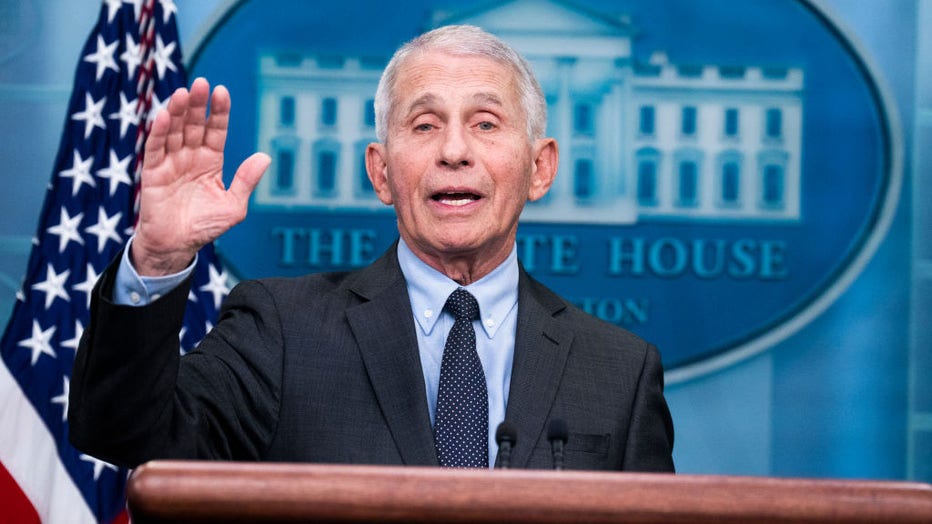Fauci urges Americans — one last time — to get the updated COVID-19 booster
Dr. Anthony Fauci, the nation's top infectious disease expert who became a household name — and the subject of partisan attacks — during the COVID-19 pandemic, announced this summer his retirement from the federal government.
On Tuesday, he appeared at the White House podium to give likely his final message to Americans. His words came familiar and consistent messaging — get your COVID shot.
The particular COVID shot that Fauci is referring to this time is a tweaked version of the vaccine, the second booster shot known as the bivalent booster.
The first look at the new shots' real-world effectiveness shows they work, he explained.
"So my message, and what may be my final message from this podium," he added with his signature smile, "please, for your own safety, get your updated COVID-19 shot."
The COVID-19 pandemic introduced Fauci to millions of Americans, though he's given straight talk to the nation about numerous other outbreaks including HIV/AIDS, SARS, pandemic flu, Ebola and the 2001 anthrax attacks.
He directs the National Institute of Allergy and Infectious Diseases, is chief medical adviser to President Joe Biden and also leads a lab studying the immune system.
In announcing his departure, the 81-year-old Fauci called his roles "the honor of a lifetime" but said it was time "to pursue the next chapter of my career."

Dr. Anthony Fauci, director of the National Institute of Allergy and Infectious Diseases, speaks about the coronavirus during the White House press briefing on Tuesday, November 22, 2022. Dr. Ashish Jha, White House COVID-19 Response Coordinator, als
RELATED: Fauci to step down after decades as top US infectious disease expert
What is the bivalent COVID-19 booster?
During Fauci’s last months in office, the U.S. has worked to roll out the bivalent COVID-19 booster, though it hasn’t been enthusiastically received. Only about 13% of U.S. adults so far have gotten the updated shot, which targets the omicron strain and the original coronavirus.
A bivalent shot strategy allows a shot to keep the proven benefits of the original vaccine while adding to its protection.
It’s a common vaccine strategy: Flu shots, for instance, can protect against four influenza strains and are tweaked annually depending on what’s circulating.
Both the Pfizer and Moderna vaccines contain the genetic instructions for the spike protein that coats the coronavirus, to train the immune system to recognize the real virus.
The new combo doses contain instructions for both the original spike target and the spike mutations carried by BA.4 and BA.5.
Does the new COVID booster work?
The Centers for Disease Control and Prevention analyzed about 360,000 COVID-19 tests given to people with coronavirus-like symptoms at drugstores around the country between September, when the new boosters rolled out, and early November. Researchers compared the vaccination status of those who wound up having COVID-19 with those who didn’t.
The new omicron-targeting booster added 30% to 56% protection against symptomatic infection, depending on how many prior vaccinations someone had, how long ago and their age, the CDC concluded.
People getting the greatest benefit are those who'd never had a prior booster, just two doses of the original COVID-19 vaccine at least eight months earlier, said CDC's Dr. Ruth Link-Gelles, who led the study.
Why do we need another booster?
The bivalent booster is the second time the U.S. government has recommended a booster shot, in addition to the first two shots in the vaccine regiment.
This leads many people to wonder, why do we keep needing another booster?
Fauci explained two parts to this answer.
First, the immunity and protection provided by the shots wane over time. The protection is different from, for example, the measles vaccine, which can protect for many, many decades, if not a lifetime.
Dwindling protection from the COVID vaccine may be solved one day by researchers, but, the other reason, unfortunately, can’t be: the fact that it mutates.
"There are no variants of measles," Fauci further explained. "I got infected with measles when I was a youngster — because I’m old enough to not be getting the vaccine — and that measles is the same measles that is circulating now in the developing world. It doesn’t change."
Fauci was born in 1940, decades before the measles vaccine was widely available in the U.S. for children. The same measles vaccine has been used in the U.S. since 1968.
Fauci, who turns 82 on Christmas Eve, said he planned to continue working after leaving the government, saying he wants to use his experience "to hopefully inspire the younger generation of scientists and would-be scientists" to consider a career in public service.
This story was reported from Detroit. The Associated Press contributed.


